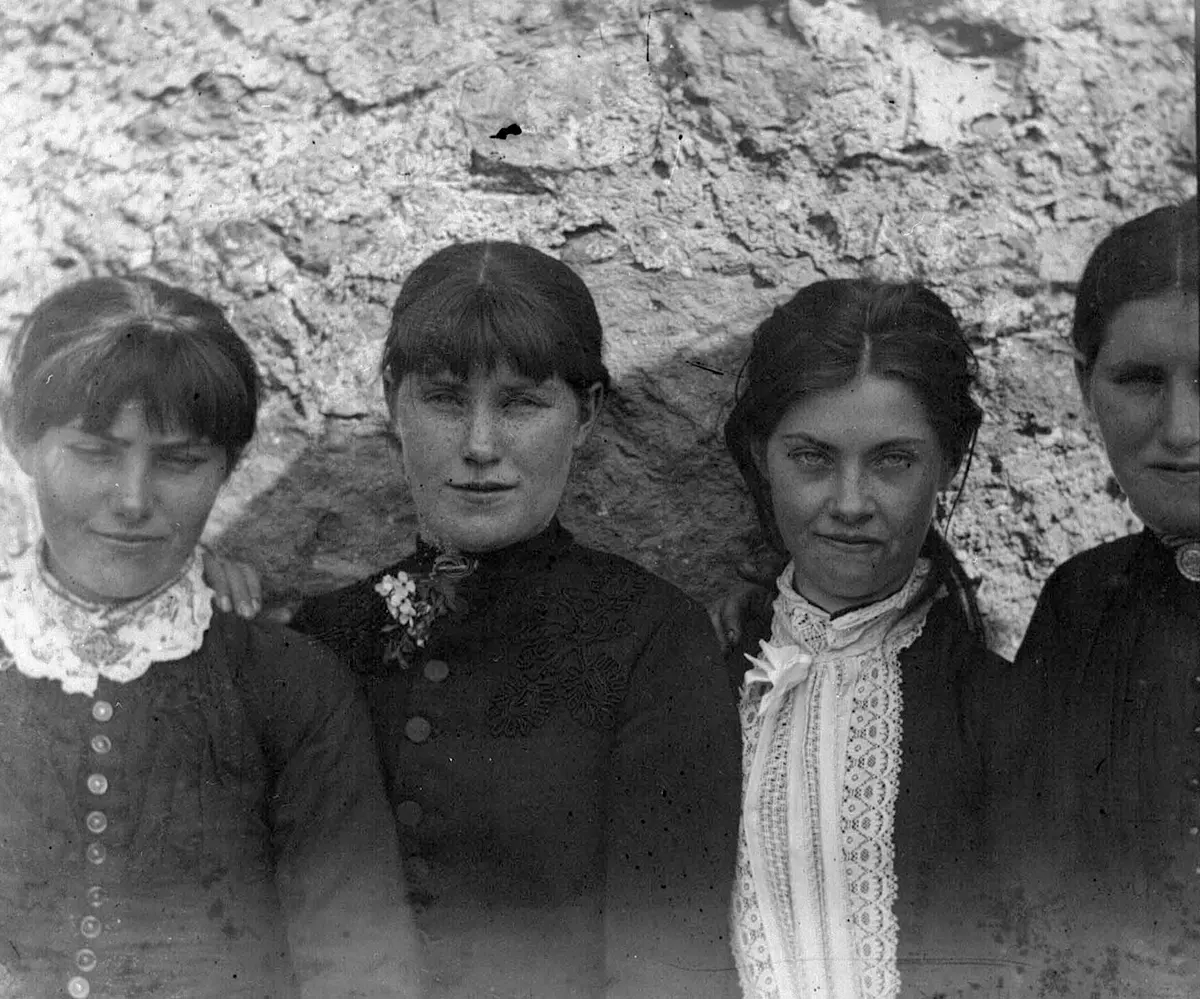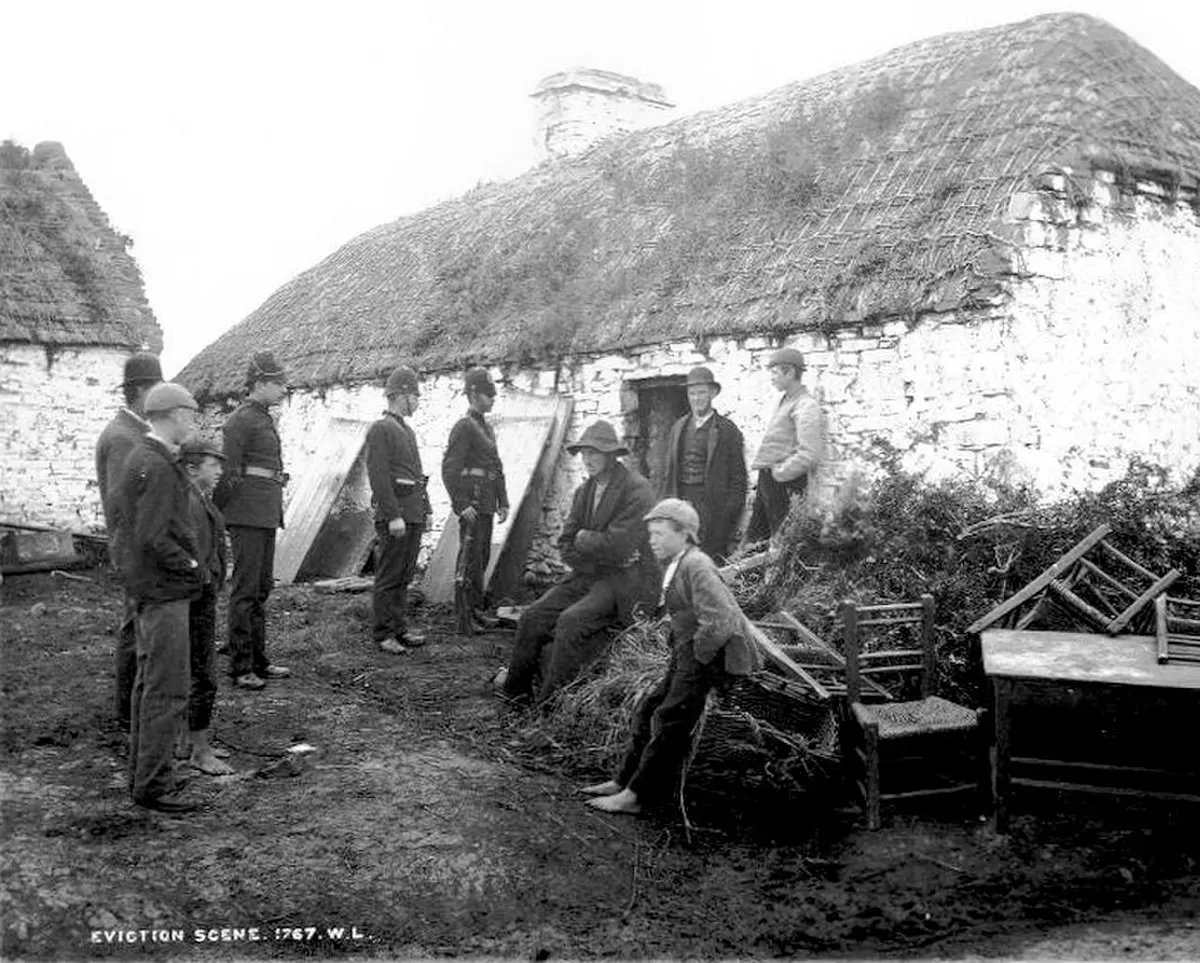The O’Halloran sisters – Annie, Honoria, and Sarah – lived with their parents and their brothers, Patrick and Frank, in the townland of Lisbareen, southwest of Bodyke village. They were the tenants of Colonel John O’Callaghan, who would become notorious by the end of the Irish Land War. The Second Irish Land Act of 1881 had attempted to give tenants more security by paving the way for rent reductions, guarantees of the same rent for periods of 15 years, and, in some cases, eventual proprietorship. O’Callaghan charged the O’Hallorans £31 which the court ordered be reduced to £22-10s – a sum the family maintained was still unfair, since before he had raised it the rent had been £13-10s. Some years previous, the rent had been raised to £33 but was subsequently reduced when the tenants took the case to the Land Court. Despite this reduction, the O’Hallorans owed two years’ rent in large part due to the construction of a new two-story slated house and outhouses. In the weeks leading up to the eviction, the family made the necessary defensive adjustments to the house: constructing earthworks in the vicinity of the house, digging a trench around its perimeter, barricading the windows and doors, and making small apertures at strategic points in the walls like loopholes. They also stockpiled pitchforks, wooden poles, and sandbags. Expecting the evictions to commence, a large crowd (8,000 according to the ‘Freeman’s Journal’) gathered daily in the village during the last week of May. On 2 June the eviction party finally arrived, consisting of the acting Sheriff, the O’Callaghan agent, a Resident Magistrate, the RIC, the 2nd Royal Welsh Fusiliers, bailiffs, and 14 emergency men. The family busied themselves boiling a mixture of dirty water and meal, and when the bailiffs cautiously approached the house, the O’Halloran sisters threw the boiling substance at them through the loopholes. The police threatened to shoot but the family remained defiant to the enthusiasm of the spectators. The three O’Halloran sisters, Honoria, Annie, and Sarah, threw cans of boiling water from the windows to keep the bailiffs at bay. The police used ladders to climb in the windows on the second floor and Honoria grabbed a police officer’s bayonet while her brother Frank knocked him out. Armed with a rifle bayonet, Honoria forced the bailiffs to retreat while her siblings fought with those who had made it into the house. Eventually, the family was overcome. In the days following the eviction, the event garnered much media attention with detailed accounts appearing in all the national and regional newspapers relaying the ‘exciting’ and ‘extraordinary’ scenes. The pluckiness, daring, and defiance showed that day was commented upon in many publications, with the Cork Examiner (11 June 1887) referring to the resisting party as ‘the indomitable O’Halloran family’. In the aftermath of the eviction, a public meeting was held locally by Davitt and Cox where they commended the strength of the O’Halloran family, and in particular Harriet’s heroic defense of her home. The case was heard in Ennis Courthouse on 20 June 1887. Following statements by the plaintiffs and witnesses, Frank and Patrick were sentenced to three months imprisonment and hard labor, while Honoria and Annie received a sentence of one-month imprisonment with hard labor; Sarah and Harriet were not sentenced. Within four years, Colonel O’Callaghan found himself in financial difficulties so he increased rents and seized livestock from those who would not or could not pay, a violation of the Land Act. In 1909, the Land Commission seized the Bodyke section of the O’Callaghan estate, and tenants were granted the right to buy their own land. By the time of the 1911 census, some members of the O’Halloran family were still residing in Lisbareen, including Harriet who was then the landowner.
Frank’s first-hand account
Their brother Frank’s first-hand account of the day of the eviction was published in the Irish Times on June 15, 1887. The following excerpt unfolds the dramatic events. This holding has been handed down to us for generations; we built the house ourselves with our own labor, it cost us £220. As for the land, no one worked harder to improve it. When the time for eviction came, we were firmly resolved to defend it with our lives. We blocked the doors with formidable logs and treated the windows in like manner. On the morning of the eviction, we were up at the break of day and laid our plans, each to defend a certain point and none to waiver, whatever might come. We boiled plenty of water and meal, and, when all was ready, kept a look-out for the bailiffs. We hadn’t long to wait, as the attacking party appeared at half ten o’clock and formidable they looked too – police, soldiers and bailiffs, all followed by a large crowd of tenants. We had two portholes broken out commanding the eastern rear corner and had plenty of pitchforks and poles to meet the rifles and bayonets when they would attempt to scale the windows. Mr. Davitt, however, deprived us of the pitchforks. I guess he thought there would be blood spilled if they were there When the bailiffs approached with picks and axes we waited until they would come near enough for the hot fluid to scald them. The police shouted to us to go in from the portholes or they would shoot, but we took no notice of them. I remember that, as they raised their rifles, the thought struck me that it was a queer country where sons of the people were the greatest enemies. The bailiffs attacked the corner and the sisters threw cans of boiling water on top of them, making them speedily retire, while the girls stood waiting with more water ready to fire. The crowd outside became terribly excited, as they saw by this that we meant no surrender. I had a long pole defending the corner, and found that I could not use it effectively from the porthole as I was left-handed; so I broke a hole through the roof, a shower of slates falling on the men outside. Then we saw that we made it impossible for them to continue at the corner. For three-quarters of an hour the struggle continued, and finally, the defeated emergency men gave up, some of them well scalded. Then they went to the end of the house and the police got scaling ladders to get through the window on the second story, so I exchanged places with my brother and went to the porthole which he had been defending. At this time some unfortunate delay occurred about handing up the water. My brother went to see what was wrong, and while he was so engaged a policeman entered through the window. He was met by Honoria who caught a grasp of his bayonet. He was just in the act of jerking it from her and I knew that if he pulled it he would cut her fingers off. I jumped off the platform and struck him with my fist under the chin and sent him sprawling to the other end of the room. My sister then had the rifle, bayonet and all, and sure she did use it. She rushed to the window and scattered the police outside right and left and cleared the ladder outside. My brother had now returned with the water, and I went to Honoria’s assistance. I got a big pole: there was a policeman at the top of the ladder; I put it to his chest, pushed him into an upright position. The policeman behind him pressed him on, while the crowd yelled with delight. I shoved harder and he fell to the ground amid cheers and shouts. Others pressed on, to meet the same fate. Now we thought it was high time to evict the policeman we had inside. We got him near the window to throw him out. The police outside rammed their bayonets and wounded us several times, so we had to throw him back again instead of throwing him out. The fight now began properly. We attacked them with all our might and so fierce was the struggle that we smashed a sword-bayonet and injured several of those outside. Eventually, we cleared the window again and victory was hailed with thunders of applause. The forces outside were dismayed, as if they did not know what to do next. We thought to use the respite we got by now ejecting the policeman, but Father Hannon put up his hands and said: ‘Don’t throw him out, Frank.’ The good priest knew that the police would fire the next time. Well, his word was law so I let him go. The police then rushed in after Father Hannon who held me as if in a vice. A great big coward of a policeman struck my mother and handled her brutally. ‘Father Hannon’ said I, ‘are you going to hold me while they choke my mother?’ He let me go. I made a spring forward and struck the policeman a blow of my clenched fist, which quietened him anyway. The house then became full of police and several of them grappled me. I made no further struggle; I knew that it was useless and felt satisfied that we had done all in our power. We were all taken into custody to be sent to jail, and Father Hannon got permission for Mr. Davitt to accompany the girls to jail. They brought my mother and myself to Limerick Jail, where we were kept until the trial. All the tenants took forcible possession immediately, and they remained there until a settlement came to the following February. (Photo credit: The National Library of Ireland / The ‘Indomitable’ O’Halloran Family By Herstoricireland.com / Wikimedia Commons). Notify me of new posts by email.
Δ Subscribe





